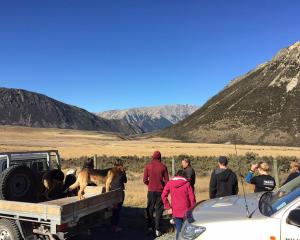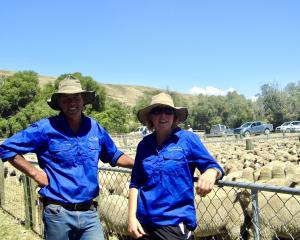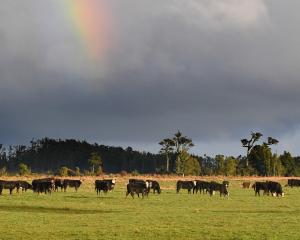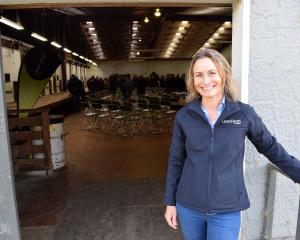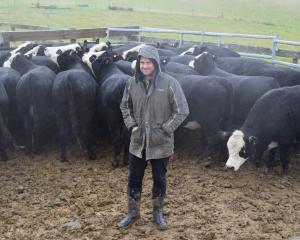
Mr McIvor is chief executive of Beef + Lamb New Zealand which is contributing funding support to the Mycoplasma bovis response.
He is also a former chief executive of New Zealand Pork, taking on the role about two months after the outbreak of pig disease PWMS (post-weaning multi-systemic wasting syndrome) in 2003.

During a brief visit to Dunedin this week, Mr McIvor said he saw no other option than a collaborative effort in mounting not only a successful biosecurity response but also surveillance and planning.
The bacterial cattle disease M. bovis was a classic example of that. The Ministry for Primary Industries had both a regulatory and leadership role, but having industry knowledge and experience alongside that made for a much more effective response, he said.
Mr McIvor’s background, coupled with a past involvement with the National Animal Identification and Tracing (Nait) scheme — of which BLNZ is a shareholder — gave him "real impetus" around the need to drive more from a leadership role, in terms of the whole biosecurity system.
The Government Industry Agreement (GIA) — a partnership between industry groups and the Government to improve biosecurity responses in New Zealand — was a "no-brainer", he believed.
It brought together government and primary industry groups to better manage pests and diseases that could damage the country’s biosecurity system, primary industries, economy and environment.
Since being appointed chief executive of BLNZ in 2016, every day had brought a challenge but it was a role Mr McIvor was relishing.
Originally from a hill country sheep and beef property in the Manawatu, Mr McIvor completed an agriculture degree and diploma in agricultural science at Massey University.
From there, his primary industry career spanned on-farm activity through to processing and retail.
He worked for Maf as a sheep and beef farm consultant in Hawkes Bay before managing procurement of Heinz Watties’ processing crops.
That was followed by the Meat Board, Meat and Wool New Zealand (now BLNZ) and Meat and Wool Innovation, and his roles included research and development manager and product and information transfer manager.
That was followed by six years at the helm of New Zealand Pork. He had always had ambitions of leadership so jumped at an opportunity to take on a CEO role.
In some ways, his career progression had taken some "odd angles" but he loved a challenge, along with continual learning.
The pork industry was totally different from the extensive, grassfed industry he had previously been involved with, but it was valuable experience.
From there, he was chief executive of Preston Corp Ltd — which included overseeing the Export Meat Warehouse chain of stores, a transport company, wholesale meat company and three butcher shops — before doing some consultancy work.
He was group general manager farm operations at Ospri when he was appointed to the chief executive role at BLNZ, replacing Dr Scott Champion.
"For me ... I’m a sheep and beef person, that’s in my blood. I’d worked in the organisation and aspired to lead [it]. I’m passionate about the industry [and] I’m a very proud New Zealander as well," he said.
He had always had a connection and empathy with farmers, but also has spent enough time outside the farm gate to understand the realities there.
Coupled with his experience across the whole value chain, he believed there were some different skills he could bring to the industry-good organisation.
He was interested in every part of the business, from branding and marketing, to research and development and extension, which was where he cut his teeth.
The trade access aspect was newer to him, as the pork industry had been largely domestically focused, but he was finding that very interesting.
Brexit was one of the biggest issues to face the industry in 25 years and, much as it was challenging, there was "absolute determination" to get a good result for industry from it.
When it came to the long-term outlook for the sector, Mr McIvor said he was "optimistic by nature".
But supply needed to double for global protein demand by 2050, and New Zealand was best positioned to meet the attributes premium customers were looking for, including natural products with minimal intervention and additives.
"If we broadly look at our production systems in New Zealand, that’s us," he said.
In May, a new brand Taste Pure Nature was unveiled by BLNZ and it was designed to capture more value for New Zealand’s sheepmeat and beef overseas.
It was resonating with premium customers and it was also bringing pride back to farmers, who were feeling "a bit dented", and sought a return to recognition as the "backbone of New Zealand" by the wider community.
"This ability to tell their story is part of that journey to get back their pride," he said.
A focus for BLNZ was around understanding what New Zealand society thought about farmers and starting to "front foot" that New Zealand farmers story domestically.
"International consumers think we are great ... domestic people are asking questions about how we farm," he said.
He believed farmers were doing " a really good job".
He visited many farms and spoke to many farmers, while also hearing concerns from consumers or activists, and was confident that farmers could match their desires.
The industry was in a good place; it had 30% fewer emissions than 1990 and, during that period, the value of the industry had doubled with a smaller footprint.
"Our story probably can’t be bettered in New Zealand," he said.
There was still plenty of room for improvement, including productivity increases, more value to be captured in the market place and other revenue from farms.
"While challenging, this is also a tremendously exciting time for our sheep and beef industry," he said.


